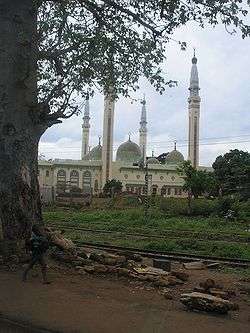Islam in Guinea
Islam is the main religion in Guinea, followed by an estimated 85% of the population.[1][2] "Most are Sunnis who follow the Maliki legal tradition and Qadiri and Tijani Sufi orders."[1]
History
Islam spread from its birthplace in the Arabian Peninsula to Africa. Sundiata Keita (c. 1217 – c. 1255), the founder of the Mali Empire (which encompassed part of present-day Guinea as well as other modern nations), was not a Muslim, but by 1300, his successors were.[3] The tenth ruler of the empire, Musa I (c. 1280 – c. 1337), made it the state religion.[3]
Fouta Djallon, a highland region of Guinea, has been a stronghold of Islam since the late 17th century.[4] The Imamate of Futa Jallon, a Muslim theocratic state ruled by the almami, was founded around 1725.[5]
Eventually, the area of present-day Guinea came under colonial rule, and French Guinea was established in 1891, but that had little effect on the spread of the religion.[3] In the 20th century, the Ahmadiyya movement was introduced into the country from Pakistan.[6]
After Guinea achieved independence from France in 1958, Ahmed Sékou Touré, its Marxist first president, sought to reduce Islam's influence, but as his popularity declined, in the 1970s he worked "to co-opt Muslim institutions to legitimize his rule."[1] Touré had the Grand Mosque built in the capital city of Conakry, with funding from Saudi King Fahd;[7] it opened in 1982. It is the largest mosque in West Africa, with an inner hall that can hold 10,000.[8]
Education
The compulsory education curriculum does not include religious studies, but there are numerous Islamic schools throughout the country, particularly in Fouta Djallon.[2] Some madrasas are financially supported by Saudi Arabia, Kuwait and other Gulf states.[2]
References
- 1 2 3 Esposito, John L. (21 October 2004). The Oxford Dictionary of Islam. Oxford University Press. p. 97. ISBN 9780199757268. Retrieved 17 November 2016.
- 1 2 3 "Guinea 2013 Religious Freedom Report" (PDF). United States Department of State.
- 1 2 3 Hill, Margeri. "The Spread of Islam in West Africa: Containment, Mixing, and Reform from the Eighth to the Twentieth Century". Freeman Spogli Institute for International Studies.
- ↑ Camara, Mohamed S. "Nation Building and the Politics of Islamic Internationalism in Guinea: Toward an Understanding of Muslims' Experience of Globalization in Africa". Embry–Riddle Aeronautical University.
- ↑ Davidson, Basil (29 October 2014). West Africa Before the Colonial Era: A History to 1850. Routledge. p. 86. ISBN 9781317882657.
- ↑ J. Gordon Melton, Martin Baumann. Religions of the World: A Comprehensive Encyclopedia of Beliefs. p. 1280. ISBN 978-1-59884-203-6. Retrieved June 4, 2014.
- ↑ "Conakry: Capital of Islamic Culture in the African Region for 2011". Islamic Educational, Scientific and Cultural Organization.
- ↑ Justin Schamotta. "Famous Places in Guinea, Africa". USA Today.

